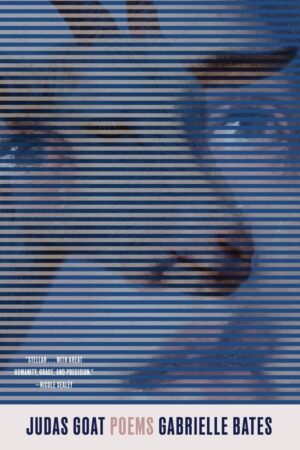In Their Own Words
Gabrielle Bates on “In the Dream in Which I am a Widow”

In the Dream in Which I am a Widow
I have carried a portion of your ashes overseas
to the Spanish statue of the falling angel,
its snake of stone wrapped twice around one leg’s ankle
and coiled around the thigh of the other, stone jaw
unhinged and reaching for the humanesque hand.
We lived, remember? Briefly, near it. One wing arcs up in the sky
erecting an honest steeple, one that points not straight,
but upward and curving. As faith goes.
Back to earth. I’ve scattered part of what you were
from the mouth of my black jacket sleeve onto the field across,
watched over by tall and leaning trees, the field
from which you returned to me so many nights
cold as ice and glowing, your socks full of grass.
I heard the door open, blessed the opening,
blessed the stench you brought inside our home,
blood tangled in the hair on your shin,
bits of another man’s flesh in your cleats.
I was curious about this forbidden felt language.
I rubbed my thumbs into your muscles,
the salt of you softening as it entered me. You were a wonder
with your bones and skin on. You focused your violence
with a pipette’s precision, and it never spilled
in my direction, never though I lapped at its opening
determined to get a taste from the source.
Years before we went north, before your bed was my bed,
there was a garden in the south we snuck to
where spring made us a headboard out of heady jessamine,
the poisonous vine’s scent sweet, aneurysmal sweet,
swelling our brains against our skulls.
I remember, even in that giddy upward state,
I always knew truth was somewhere not in that sweetness.
Now I’ve made of you a figure
always falling. What sort of monster
does this make me?
Reprinted from Judas Goat (Tin House, 2023) with the permission of the poet.
On “In the Dream in Which I am a Widow”
Several of the poems in my book Judas Goat are “pre-elegies,” or elegies for people who are, in the world of the poem, still alive. Like exposure therapy, the pre-elegy wades into fear: in this case, a loss that has not occurred.
Poetry for me, in general, is about having a transformative repository for overwhelming images. I need a place to put them down, to get them out of my mind. With a poem, I can make a film in language and transmit it into another mind for free, in the course of a single day, if factors align, and that’s a wonder to me. That’s magic. (Maybe if the barrier of entry wasn’t so high, I would be a filmmaker instead.)
“In the Dream in Which I am a Widow” came out of this impulse. It was inspired by a series of images that hit me in a barrage while I was out on a run one day in Seattle—I was running, then I was crying—The loss felt so real, it was like I’d received a transmission from a parallel universe.
Traumatic pasts, some say, are feared as futures until they are truly reckoned with in the present tense. I wondered, in writing this poem, if the same principle applied to traumatic futures: maybe experiencing a haunting future in a different verb tense loosens its grip?
Almost all of my poems feel like fiction, even when they’re inspired by my lived experience; the people who speak and appear in the pieces are fictional characters, delivering monologues or acting out stories I’ve imagined, or unearthed. “In the Dream in Which I am a Widow” is one of the only poems in my book Judas Goat that really feels like me, Gabrielle Bates, writing non-fiction.
For those interested in other poems written from a “pre-elegy” impulse, I highly recommend “Elegy [‘I think by now the river must be thick’]” by Natasha Trethewey, from her remarkable collection Thrall.



